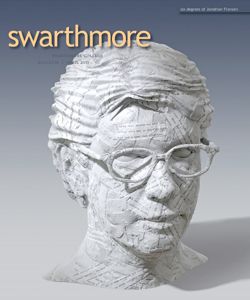Six Degrees of Jonathan Franzen
Before the National Book Award, before Oprah, before the Time cover—before anything really, really big happened—Jonathan Franzen ’81 taught fiction writing at Swarthmore. His students remember it well.
 I HAPPENED TO BE WALKING BY AN AIRPORT BOOKSTORE the day in September that Jonathan Franzen’s fourth novel, Freedom, was released. It would have been impossible to miss the advance press—a photo of President Obama carrying a copy, the author on the cover of Time—but still I was surprised to see the book so prominently displayed. Twenty or so copies in a row, showing off the cover: “FREIHEIT.”
I HAPPENED TO BE WALKING BY AN AIRPORT BOOKSTORE the day in September that Jonathan Franzen’s fourth novel, Freedom, was released. It would have been impossible to miss the advance press—a photo of President Obama carrying a copy, the author on the cover of Time—but still I was surprised to see the book so prominently displayed. Twenty or so copies in a row, showing off the cover: “FREIHEIT.”
I had just landed in Berlin.
Nearly a decade earlier, his third novel, The Corrections, had received an equally warm reception from the critics and the public. And Franzen’s past decade as a famous literary writer makes it easy to overlook the fact that for most of his writing life he had toiled in relative obscurity.
During this earlier period, in spring 1992 and 1994, Franzen returned to his alma mater to teach a writing workshop. He needed the money. “Those were tough times for me, financially and personally,” he says. By then, he’d published two ambitious novels—The Twenty-Seventh City and Strong Motion—which received a sprinkling of decent reviews but were not widely read. “At the time,” Franzen recently told The Paris Review, “I assumed the problem was not the writer but the wicked world.”
Most of the students who applied to Franzen’s workshops hadn’t read his work either. But they knew he was a professional writer, and “I don’t think many of us had met one before,” recalls Emily Chenoweth ’94, a 1992 workshop student. “And in that sense, he was exotic to a lot of us.”
Chenoweth published her well-received first novel Hello Goodbye in 2009. And she’s not the only fiction writer to emerge from the Franzen workshops. Adam Haslett’s [’92] short-story collection You Are Not a Stranger Here (2002) was a Pulitzer Prize finalist, and Esquire heralded his debut novel Union Atlantic (2010) as “the first great novel of the new century that takes the new century as its subject.” And Christopher Castellani ’94 is currently working on his third novel, following award winners A Kiss from Maddalena (2003) and The Saint of Lost Things (2005).
That each of these writers credit Franzen’s influence is perhaps unsurprising, but so too do classmates who went on to pursue careers other than fiction writing. “I’m a math education researcher, and, even in this field, I draw on what I learned from Jonathan,” says Ilana Seidel Horn ’93, a professor at Vanderbilt University. “There was a focus on narrativity, the structure of a story, in the class that also applies to teaching better ways to learn math.”
I WAS SURPRISED HOW VIVIDLY FRANZEN remembers these classes. When I spoke to him on the phone, he rattled off the reading lists. Along with a story by his late friend David Foster Wallace—“Here and There,” which Wallace hated, Franzen says—he assigned selections by Jane Smiley, Lydia Davis, Charles Johnson, and Paula Fox, among others. (“A lot of women, I now realize,” Haslett says.)
Before 1992, Franzen hadn’t taught fiction writing, and he’d barely studied it formally.
“At Swarthmore, I took a playwriting workshop with [Professor Emeritus of Theater] Lee Devin and, during the spring of my senior year, I had two sessions with a visiting writer, Tom Farber,” he recalls. Unlike a lot of aspiring writers, Franzen never attended an M.F.A. program (though he was accepted at Brown). “I got married instead to a tough reader with great taste,” Franzen told The Paris Review. “We had our own little round-the-clock M.F.A. program.” (Franzen and his former wife have since divorced.)
The workshop’s structure was traditional. Students turned in pages each week and took turns presenting every month or so. Castellani presented the 1992 class’s first story—“already, he was an unbelievably polished, beautiful writer,” Franzen recalls. On that first day of class, Franzen wrote two words on the blackboard: “truth” and “beauty,” and told his students that these were the goals of fiction.
Haslett describes Franzen’s classroom manner as “serious.” “He meant what he said and didn’t suffer fools gladly.” But this seriousness was leavened by a “great relish for words and writing,” adds Kathleen Lawton-Trask ’96, a 1994 workshop student who is now a writer and high school English teacher. “People who teach fiction workshops aren't always starry-eyed about writing, but he was. He read our stories so closely that he often started class with a rundown of words that were not used quite correctly in stories from that week’s workshop. (I still remember him explaining to us the difference between cement and concrete.) At the same time, he was eminently supportive and sympathetic; I don't remember those corrections ever feeling condescending.”
Which is not to say his students were deferential. “We were constantly challenging him, and I’m afraid we were a contentious bunch,” Castellani says. “At that time, English departments, and not just Swarthmore’s, were dominated by theory, and academic language had taken firm hold. So we were often battling between two modes of discourse—narrative and theory.”
Franzen invited David Foster Wallace to be the guest judge of the 1992 workshop, and Haslett’s story “1952” was declared the winner. Paula Fox judged the 1994 competition, won by Wendy Waesche Cholbi ’94, who is now a Web designer. “Her story wasn’t flashy in terms of prose, but I remember reading it with shivers and tears,” Franzen says.
Outside of class, Franzen was generous with his time. “Jonathan was a very generous responder,” says Jeff Severs, an English literature professor at the University of British Columbia. “We each handed in pages every week, and he responded with lots of questions and comments. I remember his red-ink check marks. He’d draw a 3-D check mark for really good stuff.” Franzen’s office hours were also very popular.
Of course, the more time he spent on his students, the less time there was for writing. “Jeff was turning in 20 pages a week,” Franzen says. “It was a pain in the ass, but it was also great stuff.”
“It’s a challenge most writers deal with,” says Castellani, who occasionally teaches M.F.A. courses and also directs Grub Street, a Boston-based creative writing center. “Some writers are good at striking a balance, like Dave Wallace,” who taught at Pomona College, Franzen says. “But for most, including myself, it’s a sacrifice.”
AFTER HIS 1994 STINT AT SWARTHMORE, Franzen taught only one other class, a 1997 M.F.A. workshop at Columbia. “The atmosphere at Swarthmore, working with undergraduates, was playful, but when you’re in an M.F.A. program, it’s about how to get published, how to make a career of it.”
By then, Franzen had begun writing for The New Yorker, mostly nonfiction of an autobiographical bent. Many of the pieces turn up in Franzen’s collection of essays How To Be Alone (2002) and his memoir The Discomfort Zone (2006). “I could earn as much money writing a piece for The New Yorker as I could teaching for a semester,” Franzen says. “And I felt like I was learning more writing than teaching.”
But Franzen stayed in touch with his former students, helping them out when he could. “He wrote a recommendation for me when I applied for an M.F.A.,” Severs says. At Castellani’s first public reading, Franzen introduced him. Chenoweth recalls bumping into Franzen at parties in New York during her time as an M.F.A. student at Columbia; Horn once house-sat for Franzen’s plants. And Haslett has become a close friend.
Franzen’s first two novels owed much to Don DeLillo and Thomas Pynchon, whose reticulating, conspiracy-laden plots often come at the expense of character. But The Corrections, which won the National Book Award, put character at the center with a close focus, in the form of interwoven novellas, on the unhappy Lambert family. And if every unhappy family is unhappy in its own way, the Lamberts’ squabbles and grievances nonetheless resonated with a vast readership. (Part of the uncomfortable pleasure that comes from reading Franzen is the recognition of his characters’ worst traits in oneself.)
“When your first two novels haven’t found much of an audience, it makes sense to stop and try to figure out who might read a literary novel nowadays, and why they might be doing it,” Franzen told The Paris Review. “I was a skinny, scared kid trying to write a big novel. The mask I donned was that of a rhetorically airtight, extremely smart, extremely knowledgeable middle-aged writer. To write about what was really going on in me with respect to my parents, with respect to my wife, with respect to my sense of self, with respect to my masculinity—there was just no way I could bring that to the surface.” In The Corrections, and even to a fuller extent in Freedom, which chronicles the sad dissolution of a marriage, Franzen manages to present these experiences—not directly, but, “[l]ike with papier-mâché, strip after strip, molding ever more lifelike features, in order to perform the otherwise unperformable personal drama.”
A LARGE, GLOBAL AUDIENCE IS A RARE THING for a literary writer. For most, devoting one’s life to writing means years of hardship, as it did for Franzen. “When people ask me, ‘should I pursue this as a career?’ I feel it’s my responsibility to be maximally discouraging,” he says. “It’s such a long shot to make a sustainable living writing fiction.”
His students recall his advice slightly differently. Franzen was never explicitly discouraging, says Lawton-Trask. “He was the first person who talked to me about my work as work, not practice—he presumed I wanted to write as well as published authors and talked to me as if I could.” But he never sugarcoated the struggles of a writing life, either. On the last day of class, Lawton-Trask recalls, he brought in a box of mementos, including a quarterly statement showing a very small amount from his publisher and a hardback copy of his second novel that he’d found in a remainder bin.
It’s a point Franzen illustrated again in the 1996 essay “Scavenging,” in which one of his former students makes a cameo:
“Not long ago, one of my former undergraduate workshop students came to visit, and I took him on a walk in my neighborhood. Jeff is a skilled, ambitious young person, gaga over Pynchon’s critique of technology and capitalism, and teetering between pursuing a Ph.D. in English and trying his hand at fiction. On our walk, as I was ranting at him, telling him that fiction is about refuge, not about social change, we passed a delicious trash pile. There was a paint and plaster-spattered wooden chair with a broken seat, and I found a scrap of two-by-four to knock the bigger clumps of plaster off. It was grubby work. Jeff said: ‘This is what my life will be like if I write fiction?’”
Paul Wachter writes in New York.
 Email This Page
Email This Page